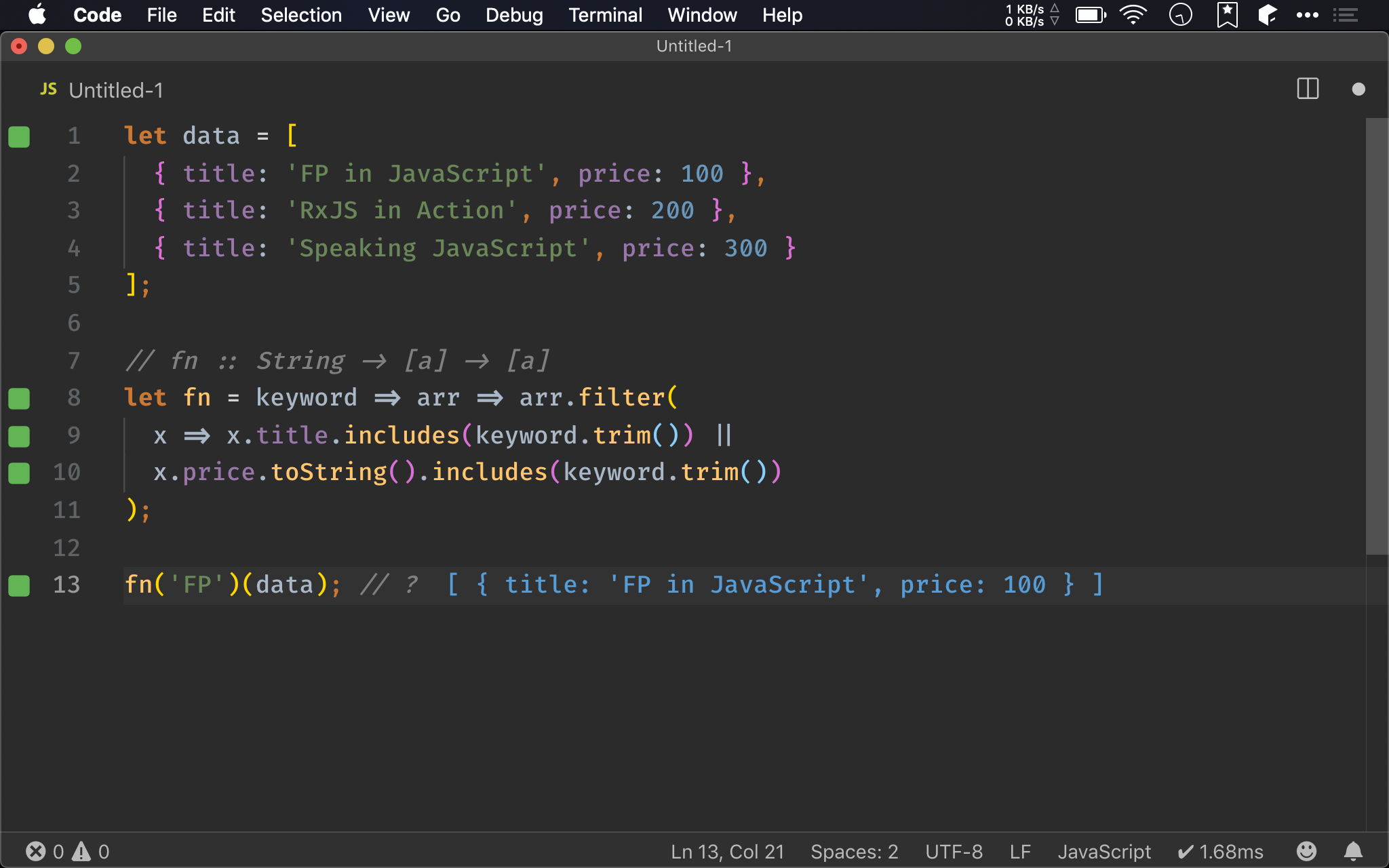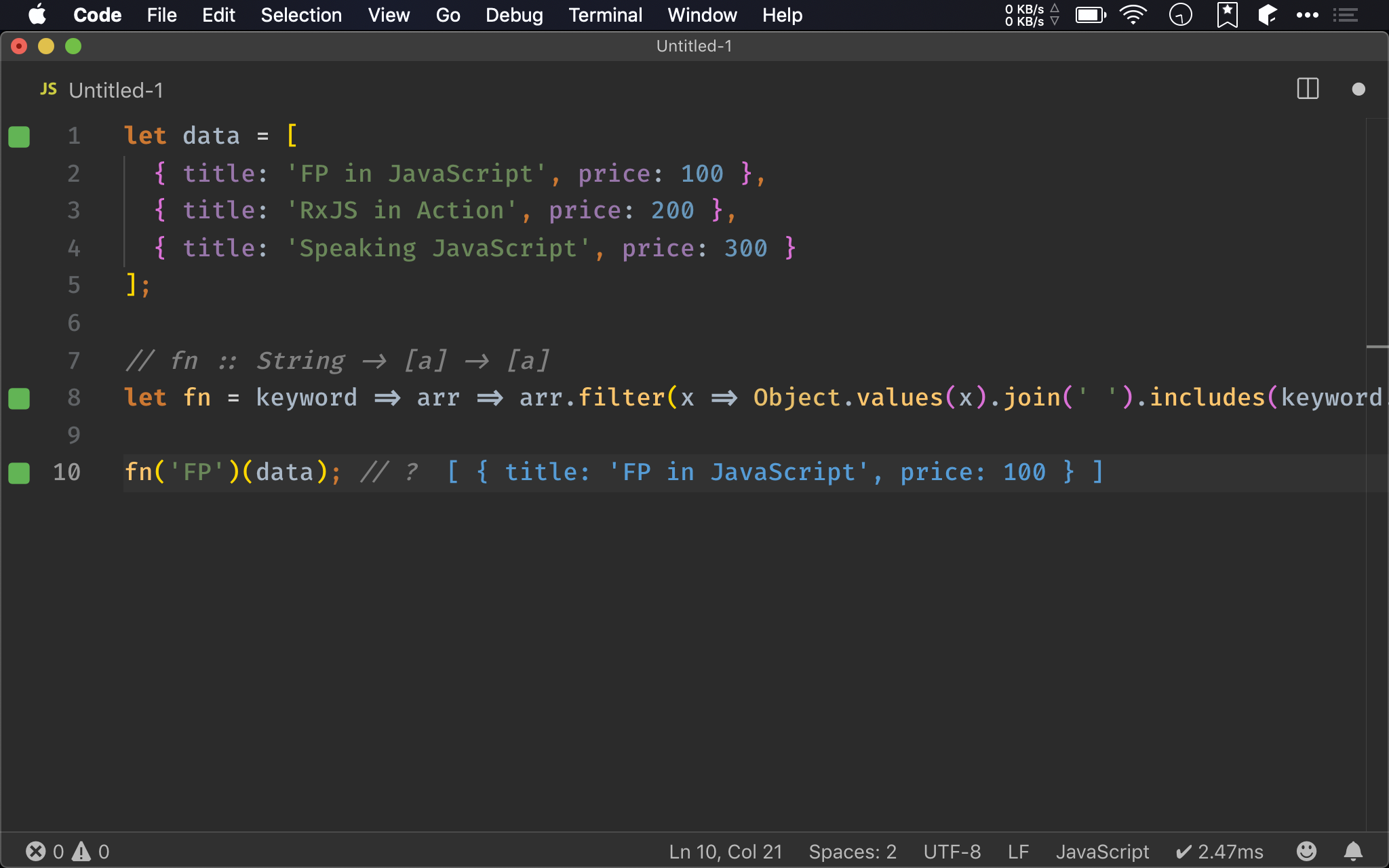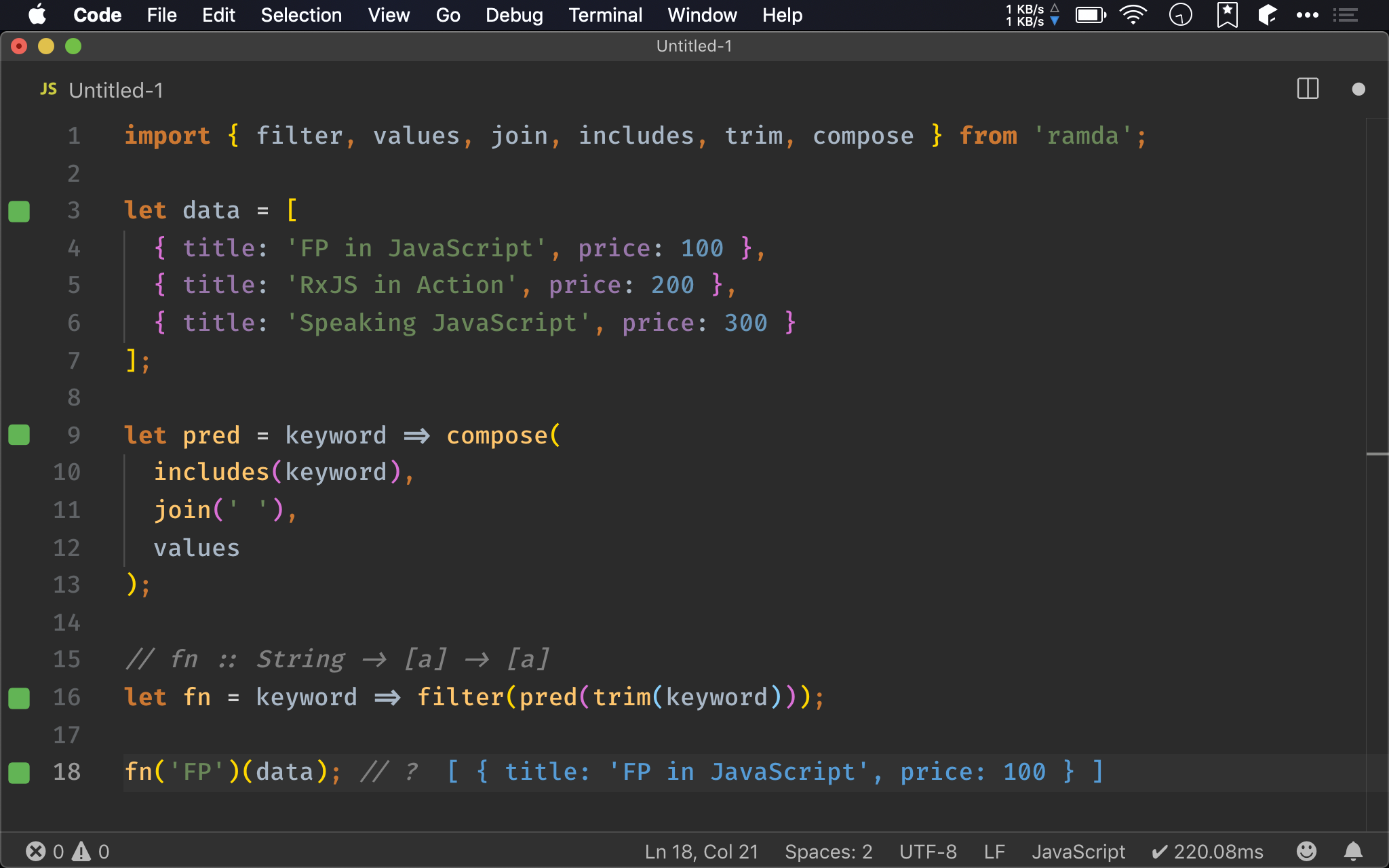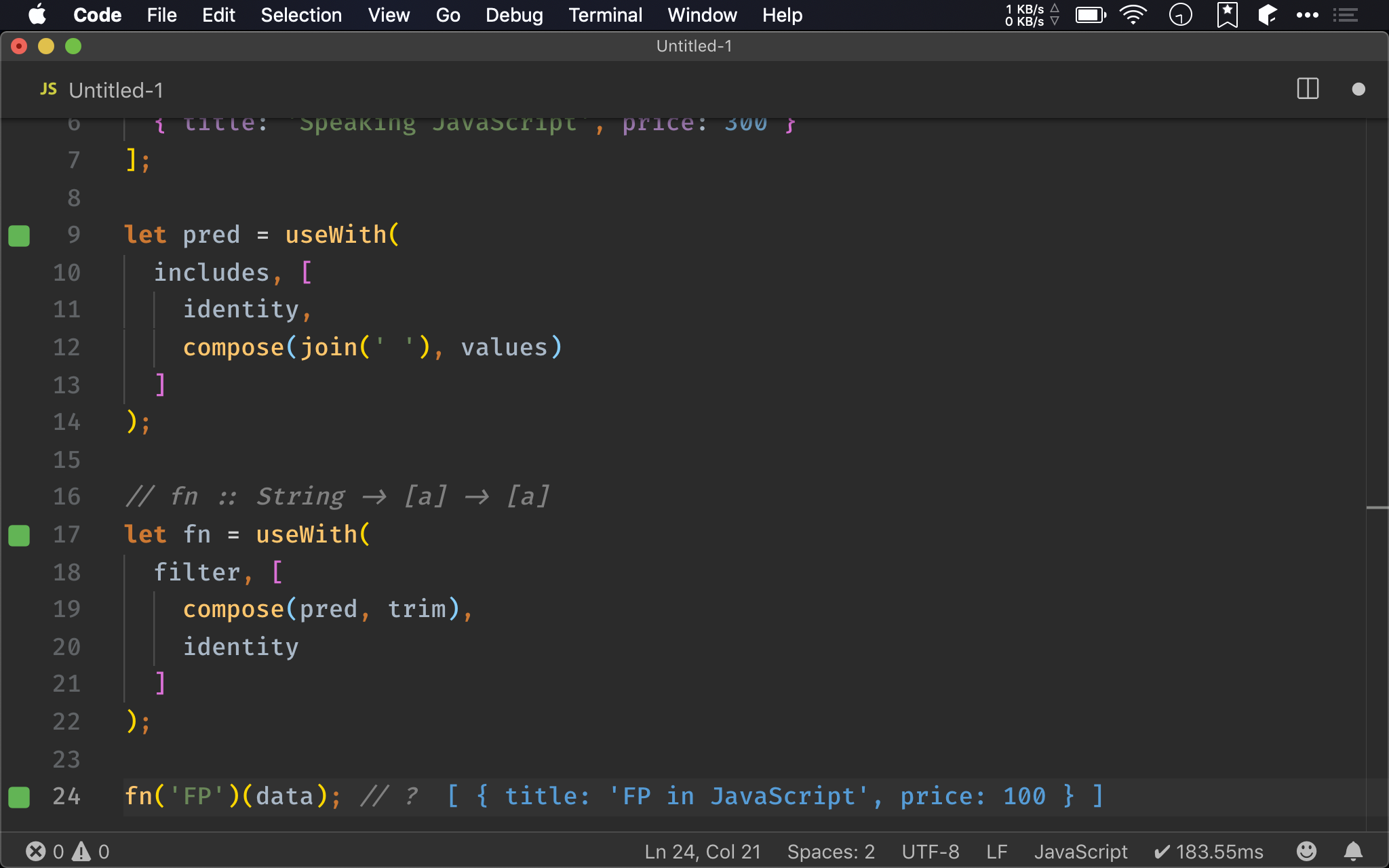實務上為了簡化 User 操作,我們希望輸入 Keyword 後,能對 Array 內 Object 所有 Property 都進行檢查,只要包含此 Keyword,就會顯示該 Object,這該如何實現呢 ?
Version
macOS Mojave 10.14.5
VS Code 1.37.0
Quokka 1.0.240
ECMAScript 2017
Ramda 0.26.1
Functional
let data = [
{ title: 'FP in JavaScript', price: 100 },
{ title: 'RxJS in Action', price: 200 },
{ title: 'Speaking JavaScript', price: 300 }
];
// fn :: String -> [a] -> [a]
let fn = keyword => arr => arr.filter(
x => x.title.includes(keyword.trim()) ||
x.price.toString().includes(keyword.trim())
);
fn('FP')(data); // ?
data 內的 object 只有 title 與 price 兩個 property,若 title 與 price 內任何一個 property 包含 keyword,則顯示該 object。
建立 fn(),argument 為 keyword 與 arr,直覺會使用 Array.prototype.filter() 處理。
由 x.title 與 x.price 取得資料,透過 String.prototype.includes() 判斷是否包含 keyword,若有則回傳 true,否則回傳 false,因為只要任何一個 property 成立皆可,所以使用 || 串起來。
由於 price 為 number,必須先經過 toString() 轉成 string 後才能使用 includes()。
為了讓 空白 顯示所有資料,特別使用 keyword.trim() 將前後空白都清除。

Refactoring
let data = [
{ title: 'FP in JavaScript', price: 100 },
{ title: 'RxJS in Action', price: 200 },
{ title: 'Speaking JavaScript', price: 300 }
];
// fn :: String -> [a] -> [a]
let fn = keyword => arr => arr.filter(x => Object.values(x).join(' ').includes(keyword.trim()));
fn('FP')(data); // ?
之前方法雖然可行,但缺點是 object 有幾個 property,|| 就要寫幾次,是否有更通用的方式能檢查 無限 property 呢 ?
若能將所有 property 取出轉成 string,只要 includes() 判斷 string 即可。
- 使用 ES2017 的
Object.values()只取 object 的 property value 部分成為 array - 再使用
Array.prototype.join()將 array 轉成 string - 最後使用
String.prototype.includes()判斷 keyword 是否存在
如此無論 object 有多少 property,寫法都不用改變。

Ramda
import { filter, values, join, includes, trim, compose } from 'ramda';
let data = [
{ title: 'FP in JavaScript', price: 100 },
{ title: 'RxJS in Action', price: 200 },
{ title: 'Speaking JavaScript', price: 300 }
];
let pred = keyword => compose(
includes(keyword),
join(' '),
values
);
// fn :: String -> [a] -> [a]
let fn = keyword => filter(pred(trim(keyword)));
fn('FP')(data); // ?
fn() 目前尚有 keyword 與 arr 兩個 argument,我們嘗試使用 Ramda 的 filter() 將 arr point-free。
filter() 的 predicate 也有 keyword 與 x 兩個 argument,也嘗試將其 point-free。
其實由 Object.values(x).join(' ').includes() 已經看出端倪,就是先執行 Object.values(),再執行 join(),最後執行 includes(),以 FP 角度就是將 values() 、join() 與 includes() 組合出新的 pred()。

Point-free
import { filter, values, join, includes, trim, compose, useWith, identity } from 'ramda';
let data = [
{ title: 'FP in JavaScript', price: 100 },
{ title: 'RxJS in Action', price: 200 },
{ title: 'Speaking JavaScript', price: 300 }
];
let pred = useWith(
includes, [
identity,
compose(join(' '), values)
]
);
// fn :: String -> [a] -> [a]
let fn = useWith(
filter, [
compose(pred, trim),
identity
]
);
fn('FP')(data); // ?
可否連 keyword 也 point-free 呢 ?
其實原本 fn() 與 pred() 都是兩個 argument,經觀察得知:
fn()最後執行為filter(),需要 transformer function 運算後才將結果傳給filter(),因此適合使用useWith()point-freepred()最後執行為includes(),需要 transformer function 運算後才將結果傳給includes(),也適合使用useWith()point-free

Conclusion
- FP 可先從 ECMAScript 原生的
Array.prototype、String.prototype學習,只是寫法沒那麼漂亮而已,但觀念都是一樣的 - 接下來可嘗試將 data 使用 Ramda 加以 point-free
- 若要連其他 argument 也 point-free,則要使用
useWith()、converge()、chain()…等高級 function,若覺得有難度,可先練習到能將 data 部分 point-free 即可,不用強求連其他 argument 也要 point-free,這需要時間練習
Reference
MDN, Array.prototype.filter()
MDN, String.prototype.includes()
MDN, String.prototype.trim()
MDN, Array.prototype.join()
MDN, Number.prototype.toString()
MDN, Object.values()
Ramda, filter()
Ramda, includes()
Ramda, trim()
Ramda, join()
Ramda, values()
Ramda, compose()
Ramda, useWith()
Ramda, identity()